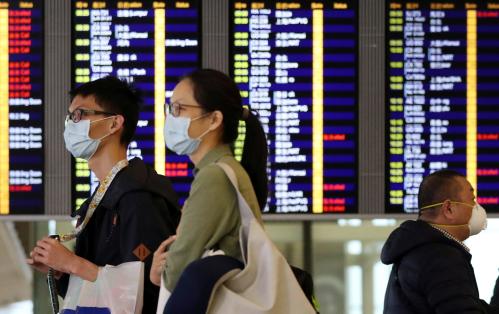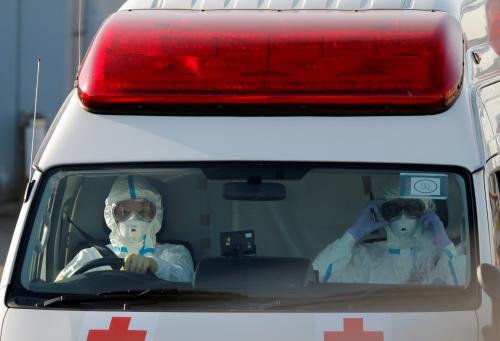The outbreak of the novel coronavirus (COVID-19) emanating from China has created worldwide alarm, and now, as two cases of COVID-19 have been confirmed in Africa, global policymakers must look to Africa’s readiness to handle a potential coronavirus outbreak.
Economic impacts could be huge
In our increasingly interconnected world, what happens in China’s economy impacts the world at large, and Africa in particular. As in the rest of the world, Africa’s economic growth numbers will be revised downward as the coronavirus further compounds already prevailing global headwinds.
The Economist Intelligence Unit estimates that the coronavirus could take 0.5 to 1 percent off China’s GDP growth. Given its lowered output, Chinese demand for Africa’s exports, including minerals, petroleum products, and other raw materials, will be reduced. Petroleum exporters like Angola and Nigeria, and mineral exporters like the Democratic Republic of the Congo (DRC) and South Africa could face reduced sales
Africa’s importers who depend on China as a principal source of goods will also be affected.
How can Africa prepare to combat a coronavirus outbreak?
If China is challenged, one can imagine how devastating the impact could be on Africa’s weak health systems. The 2014-2016 Ebola outbreak in West Africa was a wake-up call, but Africa is still working to implement solutions and strategies to prevent such a devasting epidemic again.
Recommendations include:
Harmonize and coordinate cross-continental efforts for disease prevention and control. Indeed, in 2017, Africa’s heads of states accelerated the establishment of the Africa Centres for Disease Control and Prevention (Africa CDC) under the auspices of the African Union. Along with the European Centre for Disease Control and Prevention, Africa CDC is the first public health institute mandated to harmonize infectious disease surveillance and control among a group of independent countries.
In line with the International Health Regulations (2005), the Africa CDC’s mandate includes disease surveillance, prevention, and response measures intended to shift the focus from quarantine and embargoes at borders to containment at the source. It aims to increase the emphasis on preparedness by supporting countries to establish the necessary core capacities in surveillance and response. Already, Africa CDC is responding to the COVID-19 threat: It has activated its Emergency Operations Center and, in collaboration with member states and partners, trained laboratory personnel across 27 countries and distributed test kits, provided infection prevention and control training for 22 countries, and conducted Training-of-Trainers events on points-of-entry surveillance with 18 countries. It continues to coordinate effectively with the World Health Organization.
Partner with outside CDCs to build public health infrastructure and strengthen health systems. A successful Africa CDC requires more than the establishment of a central office in Addis Ababa, Ethiopia. It also entails building up Africa CDC’s five “regional collaborating centers” (in Egypt, Gabon, Kenya, Nigeria, and Zambia), and expanding the continent’s network of National Public Health Institutes that currently exist with varying functionality in some 20 countries. Additional needs include building surveillance systems (even in remote areas), streamlining communication, establishing high-quality laboratory systems, and better equipping public health emergency teams, among others. The close partnerships with more established and experienced CDCs in China, Europe, and the U.S. can offer best practices and strategies for dealing with crises.
Building trust is key. Just as trust in financial institutions is important to avert financial crises triggered by bank runs, so is trust in public health institutions for avoiding arbitrary border controls and trade disruptions due to real or perceived risks of disease. There are different dimensions of trust when managing health crises—that between the public and the public health institutions, and among different institutions within the health sector.
However, building trust takes time. For example, in the case of trust between public health institutions such as laboratories, samples will need to be transferred across countries as was the case during the West Africa Ebola crisis when samples were moved from Guinea to Pasteur Institute in Paris. Within the guild of microbiologists, the prestige and ranking order of laboratories in different countries is almost universally recognized, and to a large extent builds on previous scientific discoveries and publications. This affects whether a country’s laboratory becomes the first choice for receipt of difficult or dangerous samples from other countries.
A major milestone since the establishment of Africa CDC is its creation of the Regional Integrated Surveillance and Laboratory Networks (RISLNET). The RISLNET platform will link Africa’s existing public health assets and build trust in these, thus ensuring that they are put to their most efficient use. Additionally, developing a repository of science-based information, and effective communications will also help build trust in the Africa CDC as the continent’s “mouthpiece” on epidemics.
As Africa becomes increasingly populous and interconnected with the African Continental Free Trade Agreement, Africa CDC will be ever more faced with complex, multidimensional health challenges that require monitoring disease risks, analyzing threats, and mounting a swift and calculated response anywhere on the continent. The establishment of Africa CDC is a huge step in the right direction. All 55 AU member states contribute financially to the AU Commission, which has committed 0.5 percent of the AU’s operational budget annually for the Africa CDC, emphasizing the strong ownership. Continued investments in health systems strengthening will be key in safeguarding the remarkable progress made toward the AU’s Agenda 2063—a prosperous, peaceful, and integrated continent.
Note: The views and opinions expressed in this article are those of the author and do not necessarily reflect the official policy or position of the World Bank nor that of the Brookings Institution.
The Brookings Institution is committed to quality, independence, and impact.
We are supported by a diverse array of funders. In line with our values and policies, each Brookings publication represents the sole views of its author(s).






Commentary
Preparing for the coronavirus and other epidemics in Africa
February 28, 2020